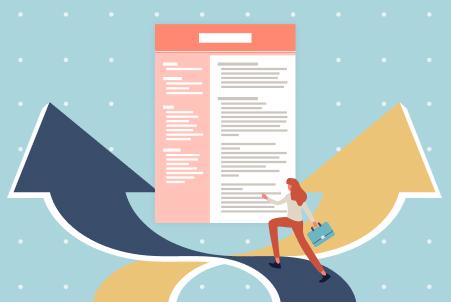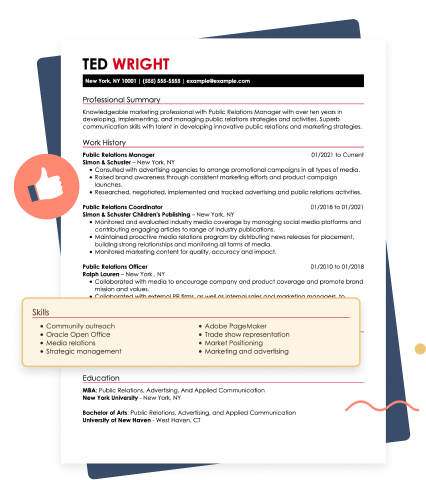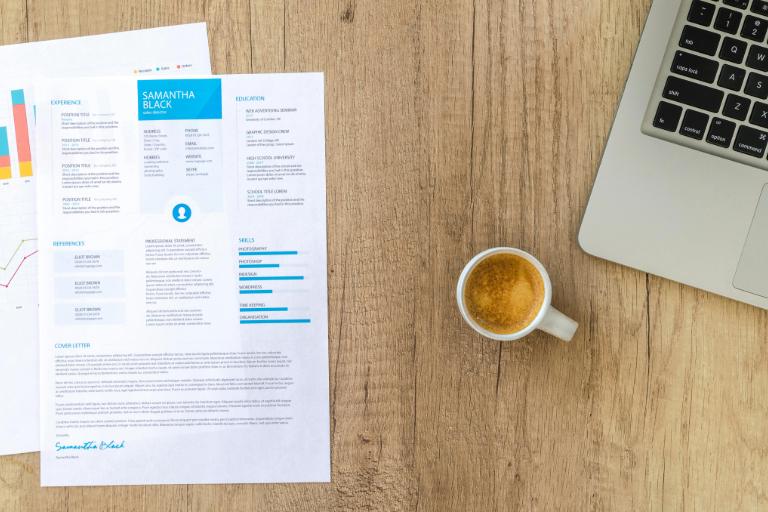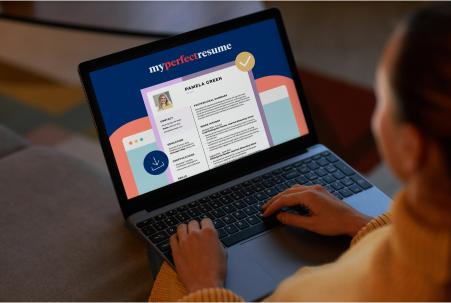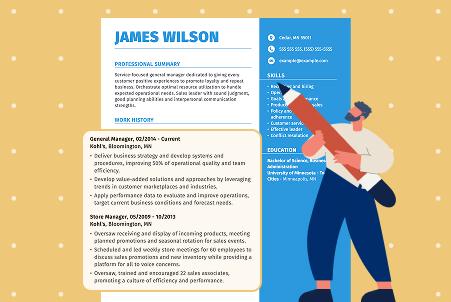How to Write Career Change Resume: Examples & Tips

Our customers have been hired at: *Foot Note
Table of Contents
Get started with MyPerfectResume today!
- Build a resume on any device
- Pick an ATS-friendly template
- Tailor with AI copy suggestions
Making a career change resume is key if you’re ready to switch to a new industry. A resume for a career change tells an employer how your qualifications fit in this new industry, your commitment to learning and gaining new skills, and why you’re a candidate worth interviewing.
In this guide, we’ll walk you through how to create a resume that bridges the gap between where you’ve been and where you want to go.
Jump to the following sections:
How to Write a Career Change Resume
Your previous experience may not seem like an obvious match, but with the right approach, you can write a resume that highlights transferable skills, showcases relevant accomplishments, and tells a compelling career story.
Choose the right resume format
The combination resume format is often the most effective choice for career changers. It merges the strengths of both chronological and functional formats, emphasizing transferable skills while maintaining a clear and cohesive employment history.
Here's why the combination format works well for a career change resume:
- Showcases transferable skills at the top of your resume.
- Supports your skills with a solid work history in reverse-chronological order.
- Emphasizes workplace achievements and relevant experience over job titles.
- Offers flexibility to tailor your resume to the new industry or role.
Write a compelling professional summary
A professional summary is a key element of a career change resume. In three to five concise sentences, it accomplishes the following:
- Showcases your most relevant and transferable qualifications.
- Communicates the value you bring to your new field.
- Demonstrates your readiness and enthusiasm for the career transition.
To craft a compelling professional summary for a career change resume, tailor it to each job application.
Begin by aligning your transferable skills with the requirements of the new role, and emphasize the experience and strengths that make you a capable and adaptable candidate in your target industry.
Results-driven sales associate with a strong background in customer engagement, market analysis, and persuasive communication, now transitioning into advertising. Demonstrated success in understanding consumer behavior, crafting compelling messaging, and fostering lasting client relationships. Passionate about applying sales expertise and creativity to develop impactful advertising strategies that drive engagement and growth.
Highlight transferable skills
As an experienced candidate, you have already gained abilities through education and experience. Any skills that can be used in your new career are known as transferable skills.
In your resume skills section, highlight transferable skills that speak to your work ethic and ability to collaborate in a team, such as:
- Time management
- Adaptability
- Ethical decision-making
- Interpersonal skills
Hard skills can also be transferable. Think of your technical proficiency, like research, graphic design, project management, and data analysis, among many others.
These skills might be used differently across industries, but you already know how to use them, which makes them a valuable asset for your resume.
Our AI Resume Skills Generator can help you brainstorm relevant skills for your resume. Simply write your desired job title, copy the skills list, and customize it to fit your needs.
Leverage your achievements and experience
The key to an effective work experience section in a career change resume is to tailor your job duties and achievements to highlight how these are relevant and transferable to your potential new industry.
Let’s continue with the sales associate example:
Sales Associate | Casanova Retail
Tampa, FL | Jan. 2020 - Present
- Developed persuasive sales strategies that increased product sales by 20%, demonstrating a strong understanding of consumer behavior and market trends.
- Collaborated with the marketing team to execute promotional campaigns, providing valuable insights from direct customer interactions.
- Analyzed sales data and customer feedback to identify trends and inform strategic decisions.
- Delivered compelling product presentations and pitches, refining storytelling techniques to create impactful advertising content.
This sales associate resume effectively positions the candidate as a strong contender for an advertising role by emphasizing consumer insights, branding, promotional strategies, and data analysis while also showcasing achievement in communication, marketing collaboration, and trend analysis.
Feature your relevant education
If your degree is not directly related to your new industry, highlight coursework and projects demonstrating applicable knowledge in your education section.
Additionally, you can include certifications, workshops, or online courses that showcase your commitment to expanding your knowledge while strengthening your qualifications.
For example:
Bachelor of Business Administration
Boston University, 2019
- Relevant Coursework: Marketing Strategies, Consumer Behavior, Brand Management, Digital Advertising
- Capstone Project: Developed a marketing campaign for a local business, increasing their online engagement by 30%
Google Digital Marketing & E-commerce Certificate (2023)
- Gained hands-on experience with online advertising, SEO, and campaign management
Include additional optional sections
A career change resume benefits from additional sections that show your interest in the role has been in the works. Plus, you can demonstrate more skills and experience to stand out from other candidates. Here are some additional sections you can include:
- Summary of qualifications: You can use a summary of qualifications to discuss how you apply your skills in the workplace and achieve results.
- Relevant projects: Any personal, freelance, or academic projects related to your new field can show your hands-on experience.
- Volunteer experience: A volunteer experience section can show employers your collaboration skills, adaptability, and commitment to your new career.
- Professional development & conferences: Shows your dedication to learning about your new industry and growing your professional network.
- Portfolio or personal website: Creative fields value portfolios, and a well-crafted online portfolio can display how you've honed your technical skills.
Career Change Resume Examples
Check out these career change resume examples to see how other job seekers leverage their qualifications to demonstrate to employers that they can adapt to the new industry.
Accountant
Sales professional
Graphic designer
Journalist
Engineer
Expert Tips for Writing a Career Change Resume
- Choose a professionally designed career change resume template to ensure your resume is structured to showcase your strongest credentials.
- Every company and role requires a specific skill set. Customize your resume each time to ensure you have the qualifications the role requires.
- Keep your resume to one page. Be clear and concise by presenting what you bring to the table for the specific role and industry.
- Empower your quantifiable achievements by pairing them with action verbs that save space and strengthen your experience.
- Incorporate industry-specific keywords from the job description to optimize your resume for applicant tracking systems (ATS).
- Don't exaggerate your qualifications. Be honest while showing enthusiasm and growth potential.
Common Mistakes to Avoid in Career Change Resumes
- Creating a generic resume that is not customized for the role and industry.
- Reusing the resume objective from your previous resume.
- Using jargon from your previous industry. Adapt it to the new industry to show you’re familiar.
- Using tasks instead of quantifiable achievements to present your professional experience. Achievements show what you can accomplish and bring to the table.
- Failing to proofread your resume for grammar, spelling, and inconsistencies. Use a spellchecker and another set of eyes to find errors and room for improvement.
Our ATS Resume Checker scans your resume and offers on-the-spot improvement suggestions to ensure your application gets noticed.
Key Takeaways
- A career change resume takes your current qualifications, skills, and work experience and adapts them for a career transition.
- Highlight your transferable skills. Focus on soft skills, but also include technical skills that could be useful in your new career.
- Tailor each resume to the specific job description. It will be your guide on what to include and how to adapt your career change resume.
- Include relevant education and professional development. Add coursework and feature certification prominently.
- Use the combination resume format to showcase both your transferable skills and your work history effectively.
FAQ
How do I explain career change on a resume?
Use a clear and concise sentence to explain your interest in the position. For example:
Seeking a career change to leverage my strong project management skills and passion for environmental sustainability in a role as an environmental project manager.
In addition to your career change resume, you should include a cover letter to complement your resume and go into more detail about your career change.
What is the best resume format for a career change?
A career change resume benefits from the combination format. As employers increasingly value both skills and experience, this format allows you to prominently showcase your core competencies while providing a clear and chronological work history.
How should a career change resume look like?
A resume must always have a clean, easy-to-read, and visually appealing look.
Depending on the industry, you can include creative elements such as color, icons, or personal branding logos. But the main role of any resume is to present your qualifications. Always opt for a simple look and let your content speak for itself.
Our customers have been hired at:*Foot Note
